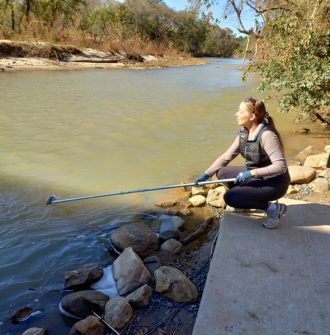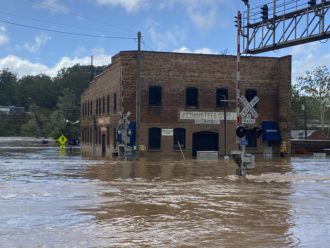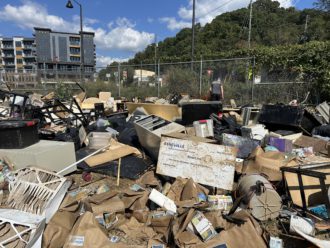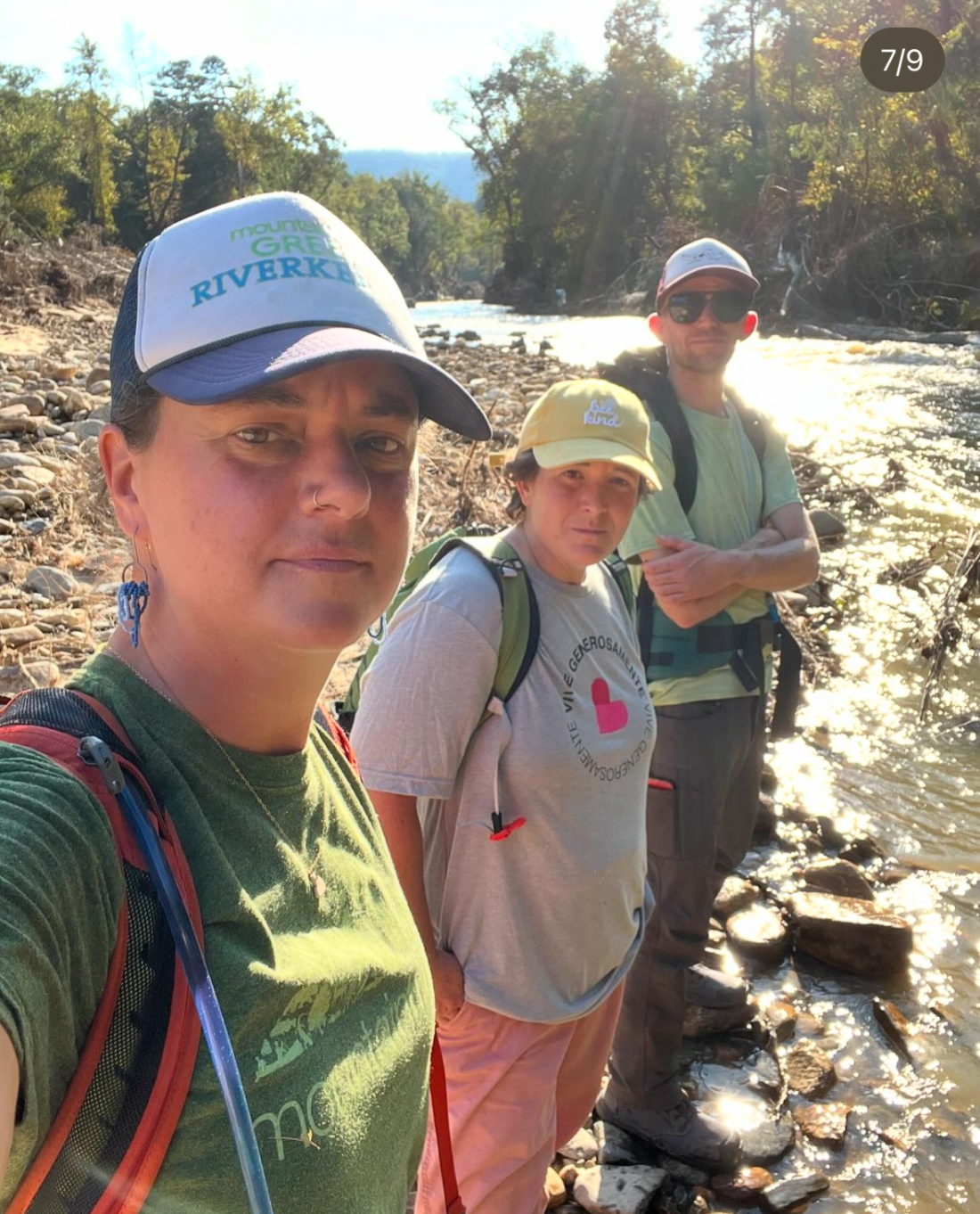Erica Shanks was in Milwaukee for a water and climate conference Sept. 26, but all she could think about was the weather back home. Saluda had gotten 5 inches of rain the evening of Sept. 24, and her hometown was projected to get quite a bit more throughout the upcoming weekend, so she landed in Wisconsin with plenty of anxiety.
“It was pretty terrifying actually, leaving an area where you knew something bad was about to happen,” she recalls.
The conference went on as scheduled, but Shanks couldn’t look away from her phone. It soon became clear that Tropical Storm Helene had ravaged Western North Carolina, including Saluda and the Green River, which she is in charge of protecting as the Green Riverkeeper. She needed to get home.
Before she could find a return flight, Shanks’ friend Chris Wing, who runs the H2o Dreams Paddling School on the Green River, was on his way to Saluda from Boone with donation money and supplies for anyone who needed them. Shanks’ recently established office near the interstate in Saluda would be the perfect place to host a resource center, the pair decided.
Shanks returned on Sept. 29, and they got to work doing wellness checks, running rescues in the Green River Gorge, and collecting and distributing supplies and gas for generators and chain saws. From sunup to sundown that first week after the storm, Shanks and her volunteer team sent search and rescue teams out to deliver supplies, clear debris and do anything they could to help local fire departments.
Shanks’ experience was not uncommon among those tasked with protecting and monitoring river waters in the region. After Helene, many jumped in to help their community in any way they could before transitioning their focus back to how they can better protect riverbanks, prepare for future storms and sustain the river-related economies that many towns in the region depend on.
Xpress sat down with several of the area’s river protectors to hear what it’s been like to oversee and protect the rivers — usually a source of life and commerce — after Helene turned them into seething waves of destruction.
Not our first rodeo

Haywood County hadn’t finished cleaning up from the devastating floods of 2021’s Tropical Storm Fred when Helene came barrelling down on the region Sept. 27. Preston Jacobsen, executive director of Haywood Waterways Association, a nonprofit focused on the health of the Pigeon River, says he expected it to take five to 10 years to clean up from Fred, and Helene’s remarkably similar impact will extend the recovery at least another decade, he estimates.
“We are again experiencing the same exact devastation and lives lost here in Haywood County, in particular from the Cruso and Sunburst areas all the way into Canton and Clyde,” Jacobsen says.
From stream-bank failures and mudslides to washed out bridges and flooding, the devastation from Helene is so similar that Jacobsen is calling this event “Fred plus 4,” in reference to the extra 4 feet that the Pigeon rose during Helene compared with the 2021 storm.
Jacobsen says damage from Fred inspired his organization to create a flood risk reduction plan, the first of its kind in Haywood County covering from Clyde all the way up to Cruso in the higher elevation parts of the county. The plan was nearing completion in September and will be ready to present to local government bodies in late November or December, Jacobsen says.
“What that plan has provided us is some momentum ahead of Helene to get some of this resiliency work going and/or to push it even further, whether that be expanding projects, additional funding, [or] additional capacity to do more work in the hardest-hit areas,” he says.

For other parts of the region, you have to go back much further to see the same scale of devastation as Helene created. Over on the Rocky Broad River in Rutherford County, Broad Riverkeeper David Caldwell pointed to a description of impacts in the Charlotte News from the infamous 1916 flood in the Hickory Nut Gorge as eerily similar to Helene.
“At Bat Cave every store was carried off … the river wiped out everything,” the reporter noted back then. “The river has widened to two or three times its usual width. Only houses built deep in the mountain sides are standing at Bat Cave. The state has had for months a special force of convicts building a splendid highway between Asheville and Rutherfordton through the Hickory Nut Gap. Great stretches of this are obliterated. Bridges and high banks of earth have been replaced by holes in the ground. The aspect of the valley, in many respects one of the most scenic in North Carolina, has been in many respects changed.”
The report quoted the chief engineer of the state highway commission at the time, W.S. Fallis, with an apt prediction. “Not in another hundred years, could a like disaster happen to the Bat Cave region, no matter how heavy the rains,” he said.
Indeed, Caldwell notes, it took another 108 years for the Broad River above Lake Lure to produce such devastation.
In Asheville, the nonprofit wholly focused on the French Broad River’s watershed, RiverLink, was at ground zero for Helene.
Though RiverLink no longer owns the building in which its offices are located on Lyman Street in the River Arts District, the high-water mark from the flood of 1916 adorns its side. Helene eclipsed that mark by a foot and a half, ruining much of what RiverLink left in its offices. The organization lost about $45,000 in office equipment, says Lisa Raleigh, RiverLink executive director.
“We certainly had a tremendous amount of displacement, just given the fact that our office and everything, all of our office equipment and our organizational equipment, was destroyed,” Raleigh says. But she sees RiverLink, which was founded 38 years ago to help clean up a river beset by industry and pollution, as well-positioned to help alter Asheville’s connections with its main river once again.
“This sort of feels like our next 35-year chapter of helping champion and reimagine what Asheville’s relationship, especially in the River Arts District and in other flood prone areas, should look like,” Raleigh says.
Lessons learned

For RiverLink, the storm presents an opportunity to learn from past mistakes and better acknowledge the potential for an increase in devastating storms due to climate change.
“I guess if there’s a silver lining, the scale of this event maybe really reinforces what it means to live somewhere so water-rich,” notes Raleigh. “Let’s collectively use this moment to see if we can come back with more resilience and what might that look like. What are some low-hanging fruits in that conversation?”
For starters, says Renee Fortner, RiverLink’s watershed resources manager, the storm has eroded the riverbanks, adding tons of sediment into the waterways.
“It’s going to be important to address those eroding stream banks, because sediment will continue to be the No. 1 pollutant for the French Broad River moving forward, and the active erosion is going to contribute to that issue,” she says.
That highlights the importance of RiverLink’s work to reduce stormwater runoff as part of its day-to-day work.
“So much of what we worked on day to day is as relevant as ever, and if anything, it’s magnified because the watershed is much more vulnerable to all these things now, like the stormwater and the new drainage patterns and the raw exposed land and sediment everywhere,” Raleigh says.
Additionally, Raleigh and Fortner observe that many of the areas with larger riparian zones — those with organic material growing along riverbanks — sustained less damage in the storm.
RiverLink’s Karen Cragnolin Park on Haywood Road, for example, maintained most of its fencing and sidewalk, which Raleigh attributes to what some may see as overgrowth along the river, blocking the view of the river from the greenway but solidifying the riverbank and preventing erosion at the same time.
Biltmore Estate’s banks on the south side of the river near Amboy Road also seemed to fare better, as there is little development close to the river on the estate, allowing for waters to spread across the floodplain uninhibited by buildings, Fortner points out. Raleigh hopes leaders will consider these outcomes when deciding how and where to rebuild near the river and prioritize passive park space over the type of development there before Helene.
Like RiverLink, Jacobsen says the storm has shown the importance of Haywood Waterways’ everyday work, and incentivizes them to scale up their efforts to conduct river cleanups, monitor water quality and conduct education campaigns in an effort to recruit new river stewards in the community.
Beyond feeling empowered in their work, river watchers say this event has shown that the community at large needs to consider how it can rebuild in a more resilient way.
“We are seeing something we have not seen before, and it’ll be quite some time until we return to normal,” Jacobsen says. “And that being said, what defines that normal is a conversation we’ll have to have for the next five to 10 years to see if there are any funding opportunities to create a more resilient community as we plan and prepare for more of these future events to occur.”
Resiliency, Raleigh notes, might mean crafting a new definition of what should exist in the river’s floodway.
River economy
In the short term, Jacobsen and Shanks are particularly worried about the stability of the river-based economies in small WNC communities built around river tourism staples like fishing, rafting and kayaking.
“One of the saddest things that we saw [after the storm] was our water-related partners and business partners closing up shop,” Jacobsen says. “That’s a major concern for us, is the economic fallout that we’ll see, but specifically the economic fallout with our businesses that are tied to the water.”
He notes that some river trip outfitters in Haywood County assisted the U.S. Environmental Protection Agency (EPA) as local experts when the agency conducted hazard surveys on the Pigeon River, helping recoup some lost profits from October. Such partnerships are occurring throughout the region, but Shanks fears there will be a longer-term economic impact, especially in towns so dependent on their local river, like Saluda’s relationship with the Green.
“There’s a big outdoor industry here that thrives off of having recreational access to that river,” she says. “And so we want to make sure that we’re doing everything correctly, so that not only the habitat ecosystems can come back to life, but also so that the local economy can survive and hopefully get back on its feet in the next couple of years.”
Power of water
The impacts of Helene run deep, and ongoing concerns run from debris cleanup to water quality and erosion.
But those who know the rivers best know that over time, waterways heal themselves. So the role of the riverkeepers is to get out of the way and let that healing happen, Shanks says.
“It’s horrible to see, but Mother Nature, she’ll be fine,” she says. “What we’re seeing — the devastation and impacts — is from us building in areas and floodplains. We’re seeing what was wiped off the map. Mother Nature, she’ll bounce back. She always will, but us having to rebuild as humanity is just … something that we’ve never had to deal with in this capacity.”
Beyond acknowledging the human toll Helene took, those involved intimately in river protection can’t help but be struck, like many of us, by the overwhelming power of water.
For Raleigh, it was seeing the breadth of the Swannanoa River in Black Mountain at its peak that made her gape in wonder. For Shanks, seeing massive, house-sized boulders moved dozens of feet after the storm, and watching as the Green River carved a new path through the gorge, gave her a new respect for the water she’s dedicated her life to observing.
“I don’t know if the right word is ‘cool’ or not, but it continually makes you respect not just Mother Nature, but the power of water,” she says. “Seeing what that can do is just … you’re in awe thinking about that and respecting what the river, what water and its flow and its power can do.”






Before you comment
The comments section is here to provide a platform for civil dialogue on the issues we face together as a local community. Xpress is committed to offering this platform for all voices, but when the tone of the discussion gets nasty or strays off topic, we believe many people choose not to participate. Xpress editors are determined to moderate comments to ensure a constructive interchange is maintained. All comments judged not to be in keeping with the spirit of civil discourse will be removed and repeat violators will be banned. See here for our terms of service. Thank you for being part of this effort to promote respectful discussion.